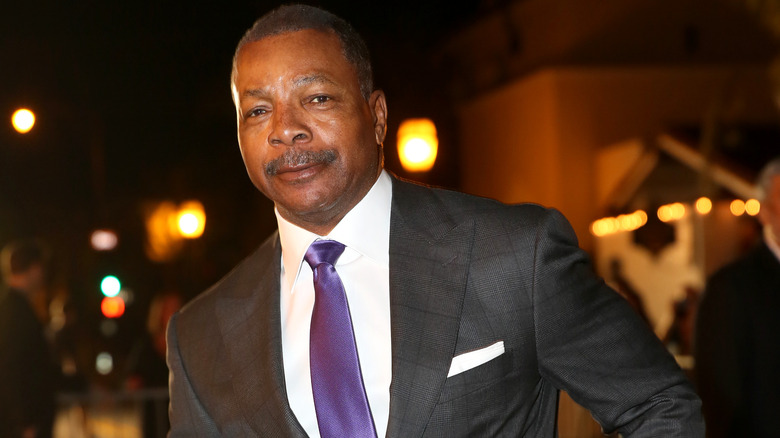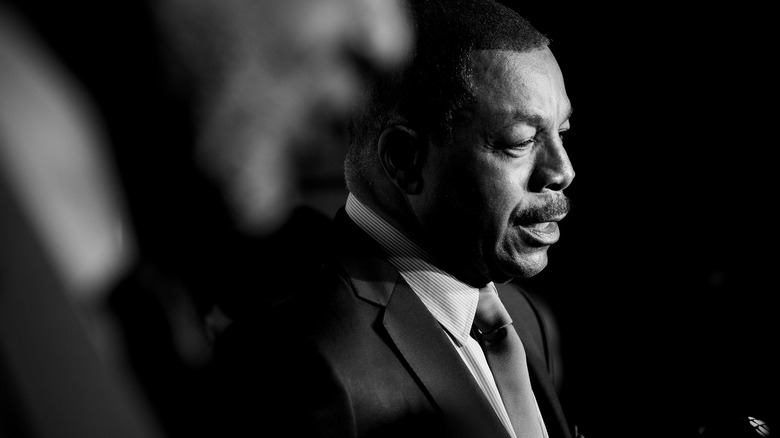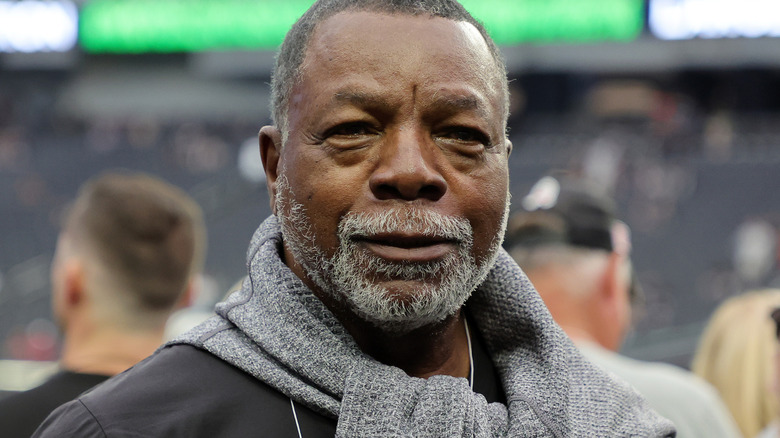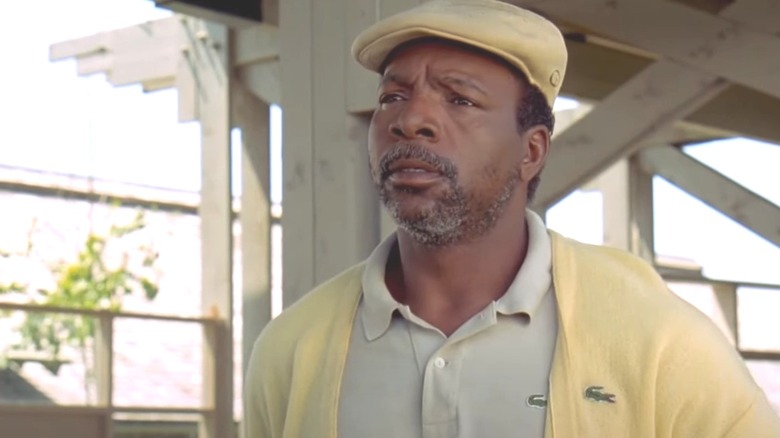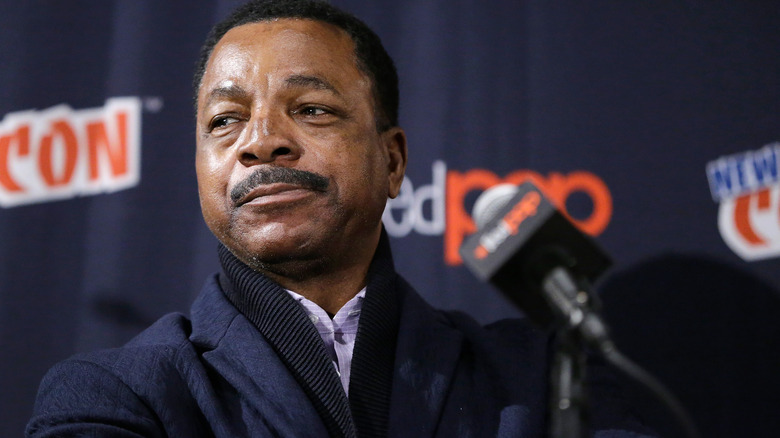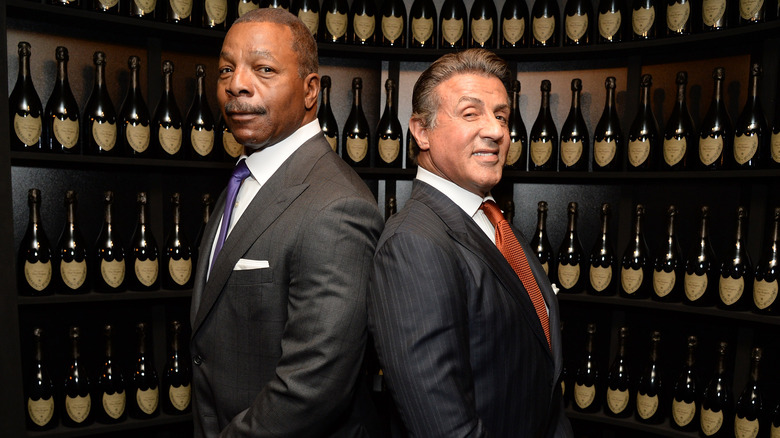The Tragic Real-Life Story Of Carl Weathers
Sometimes, the universe comes together in wonderful ways. When Carl Weathers walked onto screens in "The Mandalorian," it was like a love letter to decades past for People of a Certain Age. At the same time those People of a Certain Age were cheering on Rocky in the ring and seeing the brilliant metamorphosis of opponent-turned-friend Apollo Creed, they were also dreaming of hopping on a starship and heading off to a galaxy far, far away. "The Mandalorian" brought them together in a cosmic crash, and it was wonderful.
Weathers spoke with Hypebeast about his role as Greef Karga, and acknowledged that it was a monumental task. "It's tough, because you've got a lot to live up to. You go into something that's so beloved around the world, and you realize people have so many strong opinions about what 'Star Wars' really is. The first question was, 'How do we not screw this up?'"
Even more exciting were hints that Weathers had big plans for his character, saying that given the chance, he would have loved to direct an entire movie centered around Karga as he took on pirates and the Empire, and even to tell the story of a young Karga. Tragically, Weathers passed away on February 1, 2024, before any of that came to fruition. In a tribute to this versatile actor who embodied one of the great characters of his era, let's take a look back at his off-screen struggles.
He remembered his childhood as singularly miserable
Carl Weathers may have played one of the great fighters of the silver screen, but off-screen, he was anything but a bare-knuckled troublemaker. Weathers was born in post-World War II New Orleans, a city that had recently been a bustling hub of servicemen and celebration. But Weathers was honest about the challenges he faced.
In 1979, Weathers described his neighborhood to The Washington Post, saying it had been "a heavy-duty city when I was a kid. That was still the Deep South when I was growing up, and we were in the bowels of the city. I wasn't a fighter by nature. I held it all inside. It was not a happy time. In fact, when I'm feeling sorry for myself, I remember it as a perfectly miserable time. I think I was consciously trying to escape from a very early age."
Always in love with the idea of acting and performing, Weathers said that he absolutely didn't fit in with the tough crowd that he grew up around. He always felt that he was on the outside, hiding who he really was. "In the streets they'll kill you, literally. It was my curse to be a sensitive kid." Even when he fell in with a friend group, Weathers said he was still very aware of the fact that he was incredibly naive and still on the outskirts... until he discovered football.
His football career was filled with injuries and insults
Carl Weathers told The Washington Post that initially, he got into playing football because he realized it was a great way to get the attention of girls. When he discovered that he had an innate talent for it, it set him on a path out of New Orleans. It didn't go well, though, and his football career was fraught with injuries.
Playing first for California's Long Beach City College, Weathers was training when he tripped and hurt his ankle so badly that it took him out of play for the rest of his freshman season. From there, he made his way to San Diego State, where he made the team but ended up warming the bench after a major knee injury. Dreams of playing in the NFL seemed to dwindle with each game he sat out, but he called in some favors.
At the time, Sid Hall was the Oakland Raiders' linebacker coach, and Weathers knew him from college. Hall got him a chance with the Raiders, and Weathers told Sports Illustrated that he knew he was way out of his league pretty much immediately. When he was cut, it was with a pointed admonishment from coach John Madden: "He said to me, 'You're just too sensitive.' What the f*** do you mean, I'm too sensitive? Not that it's not true." Weathers was floored: "I couldn't let it go, man. It kind of put a chip on my shoulder on one hand, and it was like a wound on the other..."
He was severely injured on the set of Happy Gilmore
When Carl Weathers decided to channel his sensitivity into an acting career, he hit it big — literally. When actors stepped into the boxing ring for "Rocky," let's be clear that there were some real hits flying. That's what makes it so bizarre that Carl Weathers suffered a life-altering injury not while filming "Rocky," but on the set of "Happy Gilmore."
"Happy Gilmore" came out in 1996, and in 2020, Weathers sat down for an interview with GQ. He confirmed that shooting "Rocky" had been incredibly hard work, and went on to say that he was still suffering from the "Happy Gilmore" injury. It happened, he explained, when he did a fall onto a stunt bag and got stuck between the bag and a wall. It hurt, but he didn't think much of it at the time and did the stunt a few more times.
Years went by, and Weathers said that it took him that long to get sick of the then-constant pain. "I fractured two vertebrae, and osteophytes grew out and connected and it did a kind of self-fuse in a really bad place," he explained. "There were three or four years there where I was just in excruciating pain." As if that wasn't bad enough, doctors told him that they couldn't operate to fix it, and he'd just have to stick it out. The worst of the pain eventually started to recede, and he said, "I'm glad not to be experiencing what I was experiencing. It was debilitating."
He's spoken about experiences with racism
In a career retrospective on Carl Weathers, Vulture suggested that his Apollo Creed should have been the real star of the "Rocky" films. They condemned "white ethnic anxiety after the civil rights movement" as being partially to blame for the fact that Sylvester Stallone took off into the stratosphere while Weathers didn't. As for Weathers himself, he's acknowledged that he's faced some awful experiences with racism.
Weathers lent his voice to the audio book for "Pen Pal: Prison Letters From a Free Spirit on Slow Death Row," and in a 2020 conversation with Crime Story, he said that when he read the letters written by Tiyo Attallah Salah-El, he immediately knew they needed to reach a larger audience. Weathers stressed that he wasn't against the judicial system, but he also said that he was troubled by the inequality that often played out in terms of treatment and sentencing.
He went on to say that he didn't like the label of "criminal," saying that it all too often leads to a lifetime stigma — and that was dangerous, particularly when it got applied to an innocent person. And he'd been there: "I myself have never been in jail... but I've certainly had too many occasions where the police, for whatever reason, seem to be motivated to approach me for one reason or another, and there but for the grace of God I could be another Tiyo."
Carl Weathers died of heart disease in 2024
When the death of Carl Weathers was announced in 2024, the news was met with an outpouring of tributes — including a tearful one from Sylvester Stallone. In an Instagram post, Stallone spoke of the devastation that he was feeling, saying that he continued to credit Weathers for the success of "Rocky." Stallone said: "He was magic, and I was so fortunate to be part of his life... So Apollo, keep punchin'."
According to the family's statement (via The New York Times), Weathers "died peacefully in his sleep." While there were no details immediately given, updates about some recent work seem to suggest his passing was unexpected. Weathers was set to appear in a Super Bowl commercial for FanDuel, alongside Rob Gronkowski. The company reached out to The Hollywood Reporter to say that they had been in touch with Weathers' family, and added that while he would still be in the commercial and the commercial would still air, changes had been made. The ads would be re-edited, but fans would get to see Weathers for one last time.
A week after Weathers passed away, it was announced that the actor had heart disease with his official cause of death listed as atherosclerotic cardiovascular disease.
